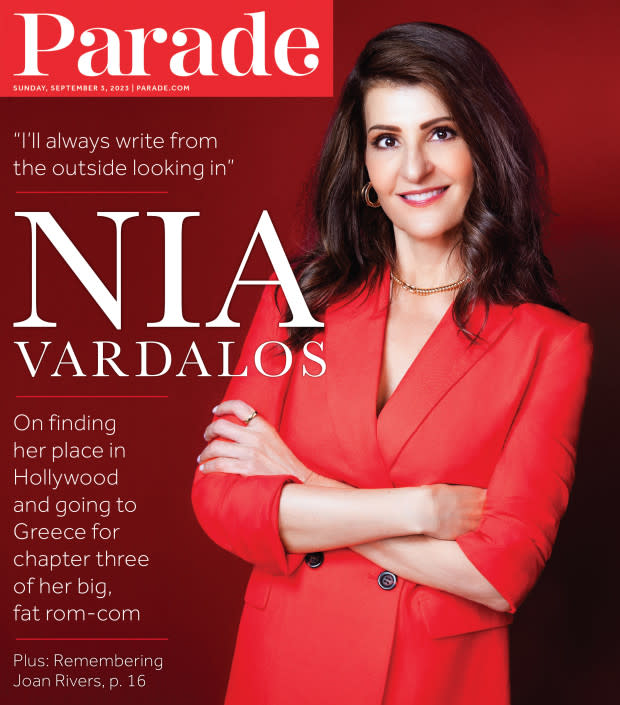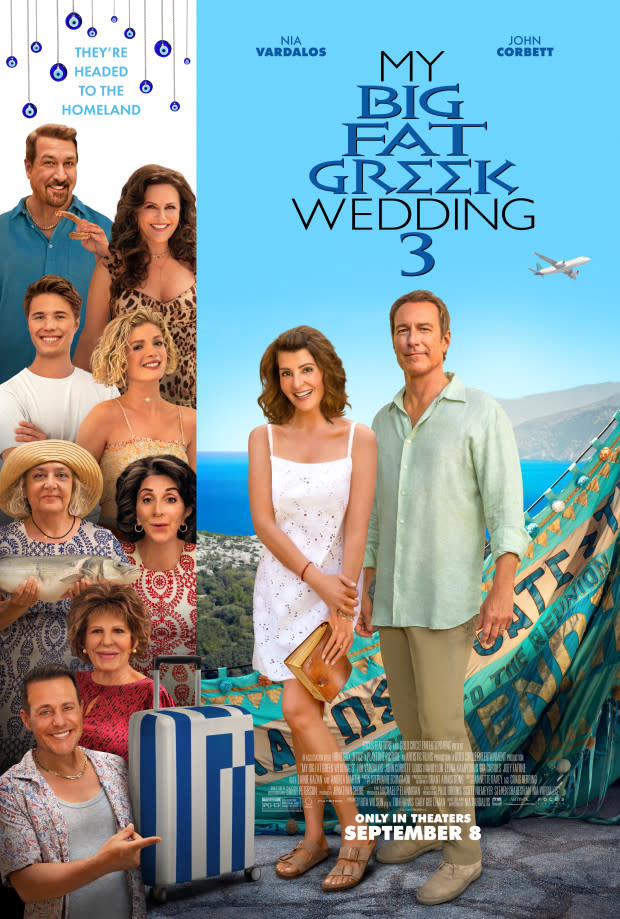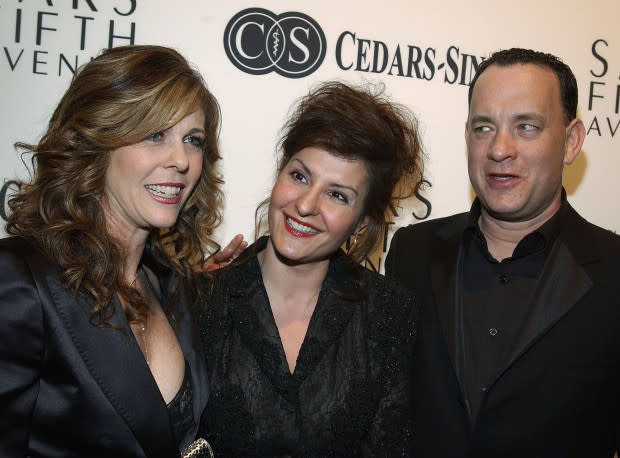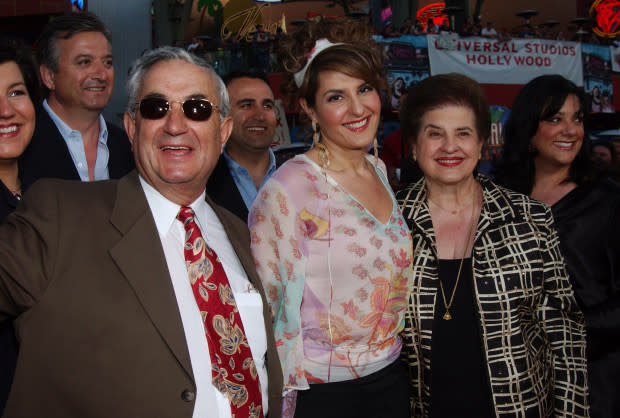'My Big Fat Greek Wedding 3' Star Nia Vardalos Says She Still 'Feels Like an Outsider in Hollywood'

Nia Vardalos holds up her right hand, showing off a lumpy, clumpy white bandage wrapped around her index and middle fingers.
Pickleball blisters? Rock climbing scrapes? Surfboard splinters?
Uh, no.
“I twisted my finger,” says Vardalos, on an afternoon Zoom with Parade from Toronto. “Guess how I twisted it? Like a dork, opening a water bottle. How uncool is that?”
So Vardalos, 60, taped her two fingers together to immobilize the injured digit and remind herself to take it easy on grabbing and gripping for a few days; she’s been doing a lot of handshaking and hugging on her trip “back home” to visit her family in Canada. A couple of fingers may be temporarily sidelined, but her ready sense of humor and unflappable high spirits are fully intact as she enthusiastically talks about her latest project, My Big Fat Greek Wedding 3, opening in theaters Friday, Sept. 8.

COVER PHOTOGRAPHY COURTESY OF FOCUS FEATURES/JANA CRUDER
You likely remember the first Greek Wedding movie, which debuted in a handful of theaters in early 2002 and went on to become a record-smashing, mainstream monster-hit rom-com, completely dominating the box office for months. It’s now regarded as the most financially successful romantic comedy of all time, with an all-time worldwide gross of nearly $369 million, an improbably colossal return on its relatively modest budget of only $5 million. If you didn’t see it, well, where were you? Because just about everyone else, everywhere, bought a ticket.
Vardalos wrote and starred in the film, based on experiences in her own extended family of Greek immigrants. It earned her an Oscar nomination for the screenplay and was also nominated for various awards by more than two dozen other film associations. And it launched an entire film franchise now on the cusp of its third chapter, two decades later.
She remembers exactly where she was 21 years ago this summer, when her little independent movie had already been chugging along in about 100 theaters for several weeks after its April opening.
“I was on vacation in Greece,” says Vardalos, “and I remember the producers calling me, asking when I’d be back.” They wanted her to go out on a promotional media tour, which is typically done before a movie opens. But something sort of crazy was happening with My Big Fat Greek Wedding; word of mouth had turned it into a must-see juggernaut, now opening in 2,000 more markets. “I couldn’t believe it,” she says. “It ended up rolling and rolling and rolling. By the time it closed, it had been in theaters for 365 days. I think I walked around with a perma-smile for a year.”
Opa! as the Greeks might say, using the expression of enthusiasm and celebration that you hear, well, several times in the movie. “We’re this nice immigrant family and no one was expecting it, so it was a time of trying to reconcile what was happening with something I had written; something that took off like a rocket ship. By November [that year], I was hosting Saturday Night Live. How do you reconcile that?!”
Vardalos has gone on to make other films, acted on TV and on stage and written a book and an off-Broadway play. But nothing connected with audiences like A Big Fat Greek Wedding and its colorful swirl of loud, loveable characters, all swept up and away in a deep-dish romance. The key to its success, she believes, was how almost everyone could relate to her wacky family, even if they didn’t have a dollop of Greek in their gene pool.
“The audience goes, ‘I have a crazy family too!’,” says Vardalos, who has written and starred in all three Wedding films and directs the third one.

Focus Features
Growing Up Greek
Antonia Eugenia Vardalos—who eventually shortened her name to simply Nia—was born and grew up in the Canadian province of Manitoba, about 50 miles north of the U.S. border. Her father, Constantine (everybody called him “Gus”) emigrated from Greece to Nova Scotia as a young man and eventually relocated to Winnipeg, the capital city of Manitoba. There he met his future wife, Doreen, in the city’s growing community of similarly resettled Greeks—and, more specifically, at the local Greek Orthodox church they both faithfully attended. The couple married and settled down, with Gus working as a builder and developer and Doreen, also of Greek descent, as a bookkeeper and homemaker. They raised Nia and her three siblings to remember where they came from, the importance of family and the ties that would always connect them to their heritage, and to each other.
Little Nia also connected to laughter at an early age. “In our family, everyone is funny,” she says. “That’s the way you got attention.” And though almost anyone can be funny, she says, Greeks are just funny in a different way.
“We would eat a large meal every Sunday—and probably all the other days of the week too,” she says with a smile. Those meals were often opportunities for friends and relatives to gather, chow down and celebrate, if only to celebrate getting an opportunity to gather and chow down. After a big feeding of baklava, moussaka, keftedes and spanakopita, she and her cousins—all 27 of them—would spread out on their backs in the living room with their heads propped on each other’s overfull tummies. Then they’d tell funny stories and tease each other, trying to start a rolling wave of contagious, infectious belly laughs.
“It was genial; nobody was mean,” she says. “We poked fun at each other, but we were never rude. If you ever hurt anyone’s feelings, you’d gone too far. Because preserving the family was more important than being funny; we were all very, very supportive of each other. And growing up in that comfort zone, that ‘bubble,’ gave me an inordinate amount of confidence later.”
Her sense of humor—and comedic confidence—was further nurtured by watching funny people on television and in movies. She reels off some of her favorites. “Andrea Martin on SCTV,” she says. “Gilda Radner, tops. Bette Midler and Barbra Streisand. I couldn’t get enough. Monty Python, when they stopped the movie [The Meaning of Life] and said, ‘Welcome to the middle of the film’… I thought, I’ve never seen anything so smart!”
After graduating high school in Winnipeg, Vardalos entered the theater program at Ryerson University in Toronto. But there her self-assuredness took a few knocks. “The reality of life really blasts you in the face when you leave your bubble,” she says. She was told she was too fat (yes, she says, they used “that word”), too dark-complected or in other ways unsuited for certain roles. She just wasn’t what they were “looking for.”
One evening, she stopped by Second City, the famed Toronto improv workshop and theater renowned as the launching pad of Canadian comedy superstars including Saturday Night Live and SCTV breakouts Dan Aykroyd, Gilda Radner, Mike Meyers, John Candy and Martin Short. And there she found what she was looking for, watching actors improvise onstage into an assortment of characters.
“I watched improv theater after being trained in Shakespeare and the classics,” says Vardalos. “I saw people become anyone or anything they wanted to be, not held down by physicality. That’s when I realized I was home.” She enrolled at Second City, taking classes, soaking up inspiration and expanding her comedy tool kit. She even won a Best Actress improv award.
At Second City, she also met and fell in love with a fellow aspiring actor, Ian Gomez. In 1993, they were married and moved to Los Angeles to further their careers and crack into show business. But it didn’t work out exactly like Vardalos envisioned—at least at first.

Getty Images
Hello, Hollywood
“I went to Los Angeles thinking I’d get a part in a sitcom,” she says. “I was shocked. People are mean.” Once again, her physicality was called into question; she wasn’t the ideal weight, her appearance didn’t fit the role, she didn’t look like the “right” minority to play this ethnic character or that foreigner. She did manage to land a few spots in a couple of small films, find voiceover work and make appearances in a handful of sitcoms, but they were mostly bit parts; characters so insignificant they were sometimes uncredited.
During a particularly low point in the late 1990s, she decided to take matters into her own hands: she would write something meaty for herself, a movie with a role specifically for her. She borrowed a friend’s computer and began writing—about her own marriage to a non-Greek (Gomez’s parents were both from Puerto Rico), her extended family back home in Winnipeg and how they initially reacted to their cross-cultural relationship. When she finished, she had a completed screenplay, a template for a film. Finally, she thought, she’d created something that might be a “fit.”
“I didn’t have an agent, so I would mail it to studios, and it would be returned unopened,” she says. Disappointed but undaunted, and inspired by her Second City training, she decided to get back on the stage and do her script as a one-woman play, a monologue that she eventually performed for six weeks in Los Angeles in the summer of 1997.
And guess who came to one of those performances? Actor-singer-producer Rita Wilson, who saw a lot she liked in Vardalos’ monologue; after all, Wilson’s mother was also a native of Greece, and she grew up, like Vardalos, steeped in traditions and the Greek Orthodox Church. Wilson was so pumped, she took her husband, Oscar-winning actor Tom Hanks, to the show. Soon Vardalos was meeting with Hanks, who at that time was branching into filmmaking. He’d just directed That Thing You Do! and was making plans to produce (as well as star in) Cast Away.
After reading her original screenplay, Hanks told Vardalos that he felt like she tapped into something broader and wider, something more universal, than what she could convey in the stand-up, solo monologue—and something with even more potential. He thought it could indeed be a movie, and a successful one. “He said, ‘I think this is for everyone,’” she recalls. “And that struck a chord in me, because I wrote it from the perspective that if I think it’s funny, so will you.”
Hanks struck another chord—one that really made her smile—when he told Vardalos that he and Wilson would, themselves, produce her movie (under the banner of his new company, Playtone, named for the fictional record label in That Thing You Do!). By 2000, My Big Fat Greek Wedding was headed into production to film in locations in and around Toronto (even though it was set in Chicago), including some scenes at Vardalos’ old alma mater, Ryerson U.
In the film, she debuted her long-awaited starring role as Toula Portokalos, a 30-something daughter in a large, loud, boisterous Greek-American family. When Toula falls in love with a charming non-Greek high school teacher, Ian Miller (John Corbett), the family is skeptical. But by the end of the film, Toula and Ian get married in a big, fat Greek wedding and her parents, aunts, uncles and cousins are all pulled into the joyous celebration.
After the film was finished, Wilson and Hanks became more than Vardalos’ movie partners; they’re now her close friends. “Hollywood can be a cesspool,” she says. “But we have a wonderfully supportive, honest friendship.” The couple also produced the movie’s sequel, My Big Fat Greek Wedding 2, and now, My Big Fat Greek Wedding 3. “We absolutely love working together.”
Vardalos says she had a lot in common with her character Toula. Like, well, everything—an awkward childhood, feeling like a misfit around schoolmates, an outsider at the lunch table full of chirpy little blondes, becoming a shy young woman, unsure of her place in the world or her future. Like Toula, Vardalos didn’t “blossom” until later; she was pushing 40 when My Big Fat Greek Wedding finally hit the screen.
And she still feels connected to her movie counterpart. “I still feel like an outsider in Hollywood,” she says. “I’ll never feel like I fit in. I mean, if I’ve been invited to parties with famous people in a room, I’ll think, Who canceled? Why am I here? I think I always write from the outside looking in. Toula is me; I am Toula.” She smiles. “I just have better moisturizer now.”
The second movie, set a decade later and released in 2016, reunited most of the original cast—Vardalos and Corbett; Michael Constantine and Lainie Kazan as Toula’s parents; Andrea Martin (another Second City alum) as her aunt; Gia Carides and former NSYNC member Joey Fatone as cousins; Louis Mandylore played her brother, Nick.
The new Wedding is even bigger, fatter and Greek-er than the others, taking the whole Portokalos extended clan (with most of the original actors) back to the homeland for a family reunion in Athens. Filming on location in Greece, says Vardalos, was amazing, like swimming in “the fountain of youth.” And it’s rumored that the movie will feature yet another wedding. It may not be their wedding, but Vardalos and Corbett will again be central to the story as the couple whose courtship started it all. “We’ve had such a beautiful relationship,” she says of her leading man, who starred on TV in Northern Exposure in the early 1990s, then Sex and the City. “I love him as a human being, as a co-star and as my movie husband. I’m so grateful he said yes to the first movie. I don’t think we’d be successful if it wasn’t for John Corbett as Ian.”
Missing from the new film, though, is Michael Constantine, who played Toula’s father. The actor, whose many TV and movie roles include his Emmy-winning stint as the principal, Mr. Kaufman, on ABC’s primetime 1970s drama Room 222, died at the age of 94 in 2021, before My Big Fat Greek Wedding 3 began production. Constantine had written Vardalos a sweet note when her father died, in March 2020, signing it, “Your other dad.”
“We were close. All of us are so close,” she says, revealing that the movie addresses the loss of her “movie” father. “We were reverent. The loss of a parent is a sobering experience. I wrote that grief [into the film] and what it feels to want to be a good child to your parents.”

Getty Images
“We’re All Immigrants”
She also wrote something else that affected her into the work. “This is the most political movie I’ve ever written,” she says, noting how she was moved—and heartbroken—when she saw the widely circulated 2015 photos of a drowned Syrian boy, found face-down and washed up on the shore of Turkey’s Bodrum Peninsula. He and his Kurdish family had been refugees, fleeing the Syrian Civil War and hoping to reach the Greek island of Kos, when the rubber dingy transporting them capsized.
“I said, ‘I’m going to write about this in a way that people will understand we are all humans,” she recalls. “And it’s unfair that people are forced from their homes, pushed out by famine or war or loss of income, and pushed into a society that is not necessarily welcoming them. So, I wrote about it in the new movie, interwoven as part of a giant braid of the bigger story. Nobody wants to be preached to, but we’re all immigrants, and that’s my message. That’s the theme of the third movie.”
As the child of an immigrant father, part of a much bigger family tree of people who came from somewhere else, immigration is important to her. “None of us were here when the founders came here,” she says. “Very, very few people can lay claim to this country that it is ‘rightly’ theirs.”
It's not her first “message” at a Greek Wedding. In the second film, audiences learned that Joey Fatone’s character, cousin Angelo, was gay when he comes out about the true nature of his relationship with his business partner. “I felt like I could spread a message of love and family [by] gently whispering tolerance,” she says. “There are some people who didn’t love that. That’s OK. I’m still going to spread my little messages.”
In these movies spinning around a big, outsized family, with messages of love and acceptance, and actors who want to come back and work with her again and again, Vardalos feels truly blessed. “It’s a rarity,” she says. “We’re corny; we love each other. It’s so wonderful to have a super-close biological family and a super-close film family.”
Related: The 12 Best Wedding Movies of All Time Remind Us Why We Love Rom-Coms

Focus Features/Jana Cruder
Getting Real
In her real, biological family, she’s roughly in the middle of her three siblings. Brother Nick lives in Australia; her older sister, Nancy, is retired and living in Greece; younger sister Marianne teaches college in Toronto.
“You can tell I’m the middle because I want everything to work out OK,” she says. “I take care of everybody,” whether she’s hosting a dinner party or on set directing films. “I’ve been on some unhappy sets, and I want to create the most happy set anyone’s ever worked on.”
At her home in Los Angeles, she’s made a happy set with her teenage daughter Ilaria, who’s just shy of turning 18. Ilaria was adopted in 2008 as a three-year-old from the foster care system by Vardalos and Gomez following their emotionally wrenching struggle to become parents. The couple divorced 10 years later, in 2018, after 23 years of marriage. (Gomez appeared, as Ian’s teacher buddy, in the first two movies, and he has a recurring role on the AppleTV+ dark-comedy series Physical.)
How closely does her own teenage daughter resemble her movie daughter (played by actress Elena Kampouris in the second and third film)? Not much, she says. “They’re vastly different. I made up a whole new storyline for the movie daughter. It’s a storyline typically reserved for men—I wanted to show what happens when a teenage girl goes to college. But I haven’t lived that yet.”
She doesn’t have much to say about the dissolution of her marriage, other than it was a moment that was “foisted on me,” and she learned how to move through it and come out the other side. “It’s best that I stay quiet about it,” she says.
“I’m a hopeful romantic,” she adds. “I believe in romance. I’ve had wonderful relationships after my marriage,” including “someone I’m in a relationship with now, who I met in the most romantic way possible—in Greece—after filming.”
But don’t hold your breath for the identity of her Mediterranean mystery man; she’s not naming names. “It seems like I put my whole life out there,” posting pics on Instagram of her brother and sisters, for instance, and pouring her life into movies. “But I’m a very private person. I don’t put my child on Instagram; I don’t talk about what I’m doing. I never, ever, say where I’m on vacation; I’ll only post after I’ve left. That’s how I maintain a bit of control.”
She is passionate about two things that keep her connected to society, she says. “I try to get kids adopted,” spreading awareness that adoption is a wonderful way to build or grow a family. “And I talk to people about writing, mentoring writers and encouraging people to write. Those are the two worlds that make me feel whole.”
At home in Hollywood, she enjoys being part of a larger community in which she no longer feels like an outsider looking in—fellow celebs connected by their Greek roots. It’s a wide-ranging group that includes her producer buds Tom Hanks and Rita Wilson (naturally), actors Billy Zane, Jennifer Aniston and John Stamos, [director] Alexander Payne and many others. Every Easter, they get together at the home of Jim Gianopulos, the former head of 20th Century Fox and Paramount studios. He and his wife, Ann, host a celebration—a big, fat “Greek Easter” celebration.
“First we go to church, because we’re good kids,” she says, smiling again. “Then we go to their house and roast a lamb on a spit in the backyard. It’s a fun party. But I would say, boy, when we’re all corralled back there, be careful—we could be taking over. All those Greeks in one place, look out. Look out!”
My Big Fat Greek Wedding 3, opening in theaters Friday, Sept. 8.
*Interview conducted before the SAG-AFTRA strike
Next, 'My Big Fat Greek Wedding 3' Is Happening! Here's Everything We Know